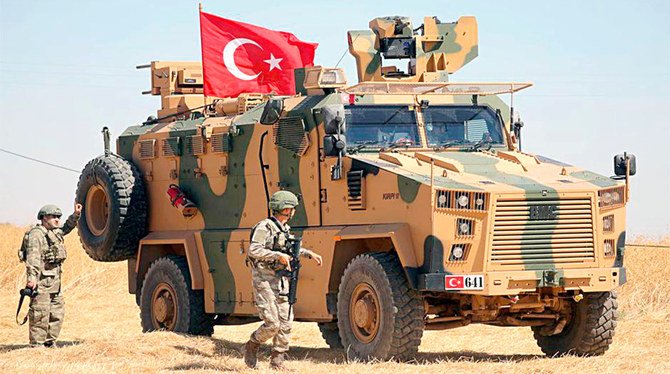ANKARA: Turkey is shifting to a proxy force strategy and diplomacy with the US and Russia to counter the Kurdish People’s Defense Units in Syria instead of deploying its own troops, analysts have said.
It comes after senior Turkish officials hinted at a strategy change regarding the war-torn country following deadly attacks by the militia in the Kurdish-dominated Tal Rifaat region, which targeted Turkish police officers.
The militia has also engaged in a cross-border shelling campaign against nearby Turkish villages.
President Recep Tayyip Erdogan said that Ankara was “determined to remove all threats in northern Syria,” while Foreign Minister Mevlut Cavusoglu pledged that Turkey “would do what is necessary for its security,” adding that neither the US or Russia had kept their promises to ensure the withdrawal of the militia from the Syrian border.
But the Turkish government has said that the military will pursue a “much more different campaign” in northern Syria, sparking debate over whether Ankara will engage in diplomatic talks with the US and Russia before launching possible military action.
The militia is the chief local partner of the US in its fight against Daesh in the region, while Turkey considers the Kurdish group and its political wing, the Democratic Union Party, as Syrian extensions of the outlawed Kurdistan Workers’ Party, which has fought a civil war against the Turkish state for more than three decades.
In the meantime, the Syrian Liberation Front branch of the Syrian National Army said that it is “determined to clear our regions from all terror groups,” including the Kurdistan Workers’s Party, Democratic Union Party and Daesh.
Soner Cagaptay, director of the Turkish program at the Washington Institute, said that every time Russian President Vladimir Putin has allowed Turkey to enter Syria and seize territory from the Kurdish militia, he has demanded that Turkey end its support for rebel groups.
“This involved a land exchange with either Turkey taking territories from the YPG (Kurdish People’s Defense Units in Syria) or the Bashar Assad regime taking territories from the hands of the rebels. But this new model that we are talking right now is a bit different from this one. Now, Turkish-backed troops in Syria, instead of Turkish troops, might move in to take an area from the YPG with a tacit agreement from Putin,” he told Arab News.
According to Cagaptay, Ankara’s broader strategy is to divide the militia-controlled zones and prevent the formation of any future political entity in the group’s territory.
“The recent Erdogan-Putin deal in Sochi aimed at implementing this new model,” he said.
Amid particularly sensitive times for US-Turkey relations, a growing emphasis on diplomatic channels outweighs military action, he added. Erdogan is expected to discuss the issue with US President Joe Biden on the sidelines of the G20 summit in Rome at the end of October.
After their recent meeting in Sochi, Erdogan will also talk to Putin following his meeting with Biden.
According to Ozgur Unluhisarcikli, Ankara office director of the German Marshall Fund of the US, the threat that Turkey sees in the Kurdish militia is the possibility of a Kurdish state being formed close to its borders.
“Ankara is therefore taking whatever measures it can to prevent this from happening,” he told Arab News.
Unluhisarcikli said that current conditions mean that it is unsuitable for Turkey to conduct military operations against YPG-held territories in northwest or northeast Syria.
Therefore, Ankara will push diplomatic channels to proceed efficiently, he added.
“Turkey is already in a tense relationship with Russia over Syria’s rebel-held Idlib province and would not like to add a new layer to these tensions. At a time when Turkey is trying to improve relations with US, it would not like to introduce a new headache,” he said.
Meanwhile, during a press conference last week, US Secretary of State Antony Blinken said that the Biden administration does not support efforts to normalize relations with the Assad regime.
Experts also note that the fate of Idlib province, hosting about 4 million civilians under the control of Turkish-backed rebels, will be critical in the coming days in shaping the calculus of Turkey’s relationship with Syria, with a potential migrant influx causing domestic political worries for Ankara.
On Saturday, shelling by regime forces of the opposition-held town of Sarmada on the northern outskirts of Idlib near the Turkish border killed four people and wounded more than a dozen, according to the UK-based Syrian Observatory for Human Rights.

